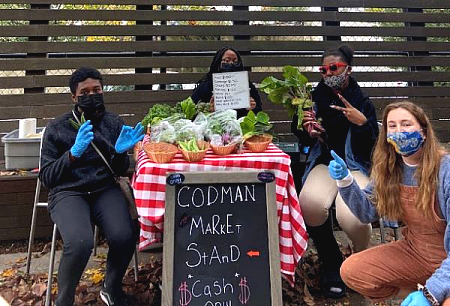Are you new to farm to school and would like to get your hands in the dirt?
Let the Patrick Leahy Farm to School Program team help get your farm to school program growing.
Sowing Seeds for Your Program's Success

Resource Hub for Farm to School Resources
The Institution for Child Nutrition's (ICN) Child Nutrition Sharing Site (CNSS) Resource Hub is a one stop shop for all child nutrition program resources. The resource hub now features a section for farm to school resources.
These free resources from various farm to school stakeholders cover a variety of topics, such as building your farm to school team, promoting your farm to school program, native/traditional food resources, and more.
Read All About it!
Farm to School Grantees are Growing Successful Programs
School gardens are an easy way to support your farm to school program goals and increase student, food service, and community buy-in. School gardens are an important element of farm to school that can literally make your program come alive!
- Success Story: Edible Gardens In New York Encourage Students to Explore
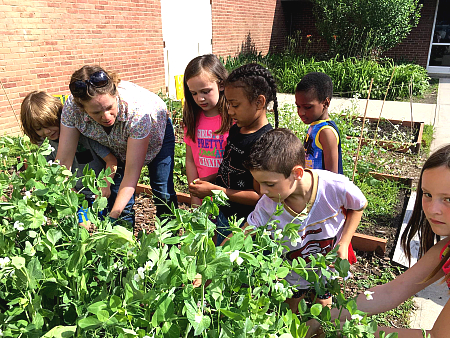
The Schenectady City School District (SCSD) in Eastern New York, a fiscal year 2019 Farm to School Planning grantee, uses their school gardens to engage, educate, and connect their students to their regional history. These outdoor classrooms are the heart and soul of their farm to school program.
SCSD currently has seven edible gardens in their district, with more in the planning stages. Their gardens range in size and function from 18 square feet of growing space at one school to 12 large cultivated raised beds in another. They also have specialty gardens such as an herb garden, a pollinator garden, a strawberry and raspberry patch, and an active sugar bush and apple orchard. They use these gardens as a place to teach their students where their food comes from and to have their students connect culturally with the foods that they grow.
Each school has a Three Sisters Garden that grows corn, beans, and squash. These gardens get harvested by 4th graders to reinforce the lessons they learn in their Native Peoples of New York units throughout the year. Each fall, the schools host their Fall Feasts featuring a stew of squash, beans, and corn, strawberry popping corn, and Mohawk cornbread sweetened by their hyper-local maple syrup. This feast is an impactful way for students to connect to their regional history.
While their gardens are sleeping over the winter months, students help tap campus maple trees to learn about the ancient and indigenous way of transforming sap into sweet syrup and sugar. In classrooms students prepare for the upcoming planting season by learning about compost with their classroom vermicompost bins. This encourages students to understand soil health, nutrients, decomposition, and food webs during the long winter months.
In late spring as many classrooms as possible around the district visit their gardens to harvest salad components to put together and eat in their classrooms. The children love growing dill in their school gardens. In addition to its unique flavor, it is one of the host plants for the eastern swallowtail butterfly. Students venture out into the gardens with hand lenses in late May/early June to find swallowtail eggs and larvae to raise in their classrooms and then release back into the gardens.
With the summer season being short, SCSD encourages their summer program students to work in the gardens each week harvesting and tasting lettuces, tomatoes, eggplant, peppers, summer squashes, and other warm weather treats while learning about food systems, soil health, water cycle, pollination, urban farming, and local agricultural history.
SCSD’s goal with their edible gardens is to not only expose students to fresh, nutritious produce they often don’t have regular access to, but to also stimulate them to explore their curiosity. These activities and others not only engage students, giving them a deeper understanding of curriculum, but they also connect them more strongly to their schools and communities. They hope that with every seed they nurture to harvest, a similar seed of resilience and knowledge is being cultivated within the children.
The best thing about a school garden is that they can come in any shape or size and thrive in all seasons and climates. Gardens can be as small, and simple as you want, or as complex as you want. Hoop houses, hydroponic systems, tower gardens, and other unique gardening mechanisms are popping up around the country. At the USDA, we recognize the important role school gardens have in engaging students of all ages around the country. School gardens are living laboratories that create teaching opportunities ripe for nutrition and agriculture education.
- Success Story: Lettuce Grow with Urban Agriculture
Started in 2001 with 33 students, Codman Academy Charter Public School (CACPS) now serves 350 students from pre-k to 12th grade. CACPS is located in the heart of Dorchester, Massachusetts. This is one of the most economically underserved neighborhoods in the Boston area. Virtually all students qualify for free or reduced-price lunch through the National School Lunch Program. Part of the school’s vision is to, “educate the whole student: mind, body, and character” as well as, “build a school community rich in rigorous academics and daily experiences of discovery.”
In fiscal year 2020, Codman Academy was awarded a USDA Farm to School Implementation grant to expand upon and enhance their urban agriculture program. At the core of their program is hands-in-the-dirt education, in collaboration with city partners. One partner, Green City Growers (GCG), works with CACPS to offer an after-school enrichment program that allows students to participate in garden-related activities. Earlier in the fall, GCG and CACPS harvested lettuce to make salads and learned how to save seeds from fruits. This past fall, they carved pumpkins, created pollinator seed balls, and harvested sweet potatoes.
Each year, high school student Farm Food Ambassadors are selected to partner with community producers and learn garden management. The 14 varieties of produce that are grown in the garden are then harvested and sold by students. The most recent harvest in September yielded $70 in profits for the Farm Food Ambassadors program. One Farm Food Ambassador, Kayla, explained, “I spread the word around my school and try to get as many customers as I can to come outside and check out the market that is happening. I learned how to count change and give customer service. I am also learning how to grow food! I love the nasturtium leaves; they are spicy, and I didn’t know you could eat flowers!”
Your farm to school program can be an excellent resource for teaching math, literature, business, or any discipline. Since the early 1900s, U.S. teachers have made these connections to foster experiential education. The potential is endless: high school biology classes, culinary classes, student taste tests, or to offer students job training and professional experience in agriculture.
- Success Story: Jones Valley Teaching Farm’s Apprenticeship Model
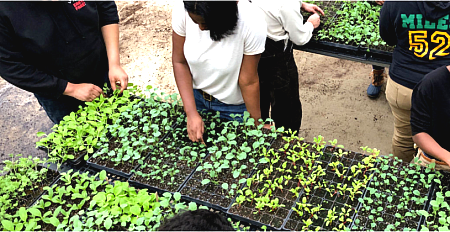
A great example of encouraging youth to explore agricultural careers is the Jones Valley Teaching Farm’s Apprenticeship Model. Located in Birmingham, Alabama, the Jones Valley Teaching Farm, a FY 2019 Farm to School Implementation grantee, created two apprenticeship pathways for Birmingham City School students: Woodlawn High School Apprenticeship and the Graduate Apprenticeship.
These apprenticeship programs are for select Birmingham City School students giving them an opportunity to participate in paid apprenticeships that also count for course credit.
The Model was created with sustainability at its core. This is achieved by employing the very individuals and young minds it has enriched throughout their school careers and uses this as an inspirational driver of their work as it moves forward into the future.
Woodlawn High School Apprenticeship
In this High School Apprenticeship, students manage a 2-acre urban farm in Birmingham’s Woodlawn community learning the essential skills of farm production, from soil preparation to harvest, as well as receiving professional development.Graduate Apprenticeship
Graduates of Birmingham City Schools have an opportunity to enter a 15-month, full-time, paid immersive apprenticeship. Apprentices learn about farm management, receive agricultural focused professional training, workforce development, and participate in enrichment experiences. Over the course of the apprenticeship apprentices will be exposed to pathways that will lead them towards economic mobility.
Partnering with multiple disciplines not only makes education interactive and engaging, but many hands make light work. It can also bring more commitment to your farm to school project and increase the likelihood that your program will be sustained. Who in your school district might be interested in growing your farm to school program?
- Success Story: Royalton-Hartland K-12 Agricultural Education Center of Excellence Program
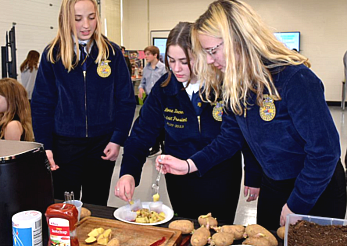
Teaching children throughout their school years that agricultural careers come in all forms and helps to educate our youth about the opportunities that could be had when choosing a career in agriculture and food sciences. The Royalton-Hartland (Roy-Hart) School District in Middleport, New York, a FY 2021 Farm to School Implementation grantee, have created an innovative K-12 Agricultural Education Center of Excellence Program. Their Agriculture Education Center has three areas of focus: small animal care, food science, and agriscience labs.
Roy-Hart High School students have more reason now to pursue a higher education in agricultural sciences with the opening of the new labs:
- Agriscience lab: In agriscience lab students are working on projects related to innovation in agriculture, such as finding improved alternative designs for greenhouses, using growing towers that use UV light to grow lettuce, and coding for automated farming vehicles – drone tractors! One particular project has a large pool containing koi and goldfish to demonstrate how fish waste can be used as an alternative fertilizer for plants.
- Small animal care lab: The small animal care lab has multiple animals who were tended to by students, like: hamsters, guinea pigs, rabbits, a chinchilla, and a bearded dragon. This lab is designed to support the animal science curriculum and provide hands-on learning opportunities for students. Some of the concepts covered are: animal grooming, health exams, sanitation and other small animal concepts.
- Food science lab: The lab/classroom space features the latest instructional technology and can serve up to 30 students. It is equipped with multiple workstations for the preparation and processing of food. The lab will be used during the school day in support of the Food Science class, in the evenings and weekends for adult continuing education and special immersion/enrichment experiences for students.
Farm to School Education Curriculum from Team Nutrition
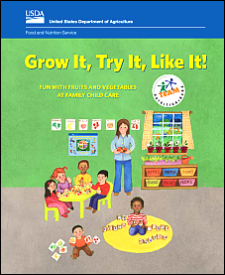
Grow It, Try It, Like It!: Grow It, Try It, Like It! Fun with Fruits and Vegetables at Family Child Care is designed to help Child and Adult Care Food Program (CACFP) operators provide garden-based nutrition education for children ages 3 through 5 years old in family child care settings. Through the activities in Grow It, Try It, Like It!, children touch, smell, feel, and taste new fruits and vegetables. Children also learn how fruits and vegetables grow. Planting activities help children connect the delicious food choices at the table with farm, orchard, or garden.
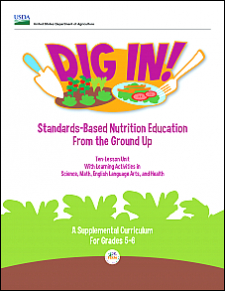
Dig In: Explore a world of possibilities in the garden and on your plate using ten inquiry-based lessons that engage 5th and 6th graders in growing, harvesting, tasting, and learning about fruits and vegetables.
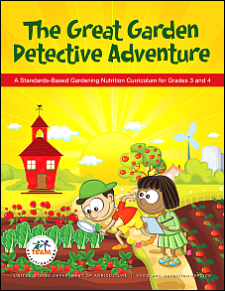
The Great Garden Detective Adventure: This eleven-lesson curriculum for 3rd and 4th grades includes bulletin board materials, veggie dice, fruit and vegetable flash cards, and ten issues of Garden Detective News for parents and caregivers.
Interested in getting a garden started at your school?
Review these resources for new gardeners:
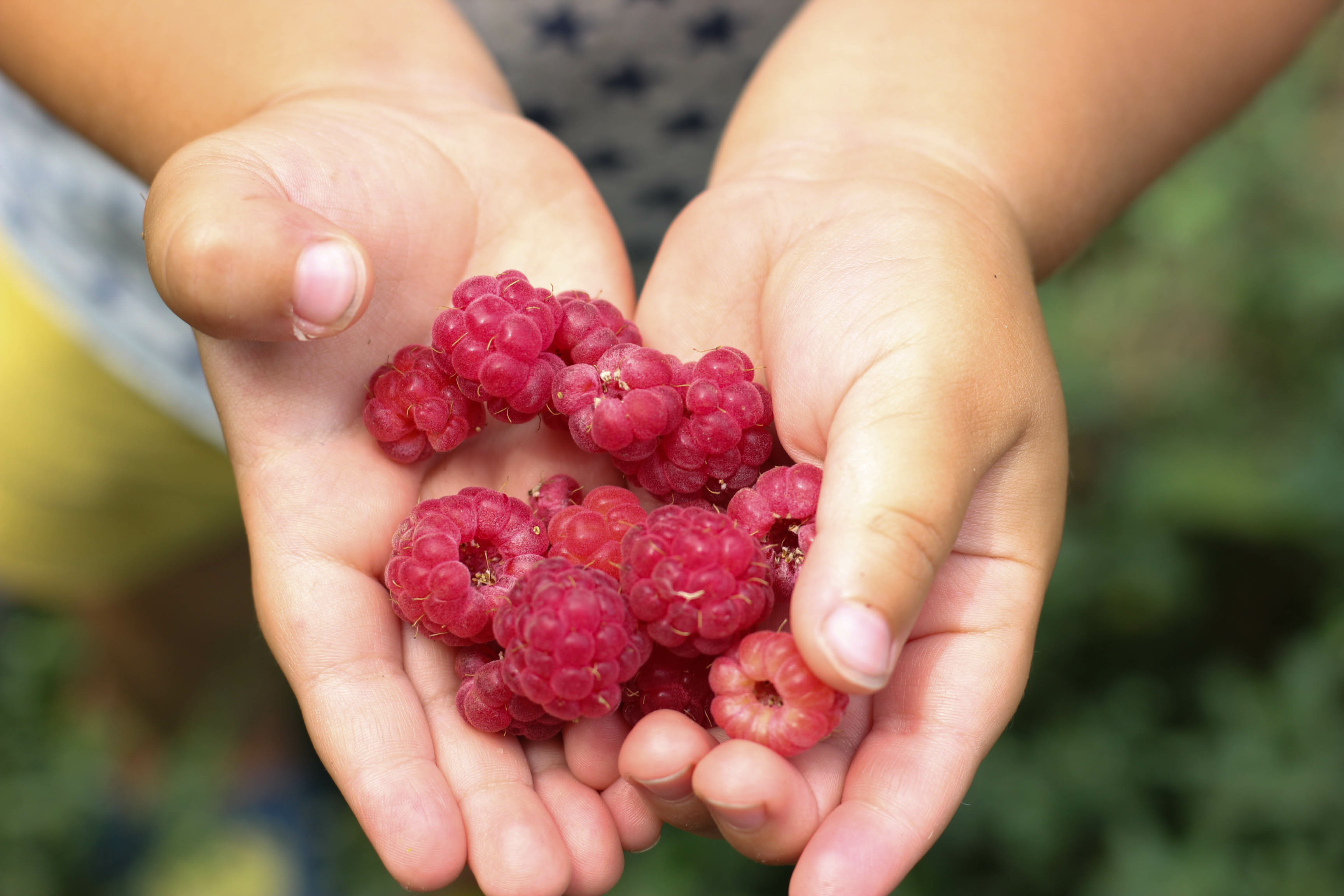
Contact Your State and Regional Farm to School Offices
USDA FNS State Contact Page
Find state agency farm to school contacts.
USDA FNS Regional Contact Page
Find the contact information for each of USDA's seven Farm to School regional specialist offices.
Hungry for more information?
Visit the Farm to School Fact Sheet Page.
Sign up for the Dirt, the e-letter from the Patrick Leahy Farm to School Program, and review prior editions.


